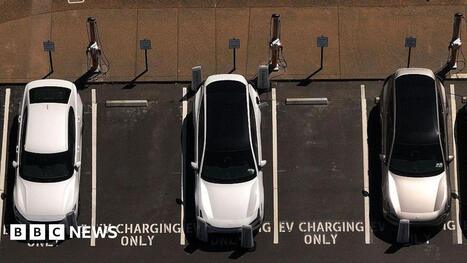 Your new post is loading...
 Your new post is loading...

|
Scooped by
Graham Watson
Today, 2:24 AM
|
Under new proposals, sellers and estate agents will have to provide key information about a property up front.

|
Scooped by
Graham Watson
October 5, 2:53 PM
|
As well as embracing ‘beautiful coal’, the president has set about obliterating clean energy projects

|
Scooped by
Graham Watson
October 5, 2:46 PM
|
Despite a recent surge in demand, the US is a laggard in EV sales compared to much of the rest of the world.

|
Scooped by
Graham Watson
October 3, 11:00 AM
|
The EU and the UK have imposed sustainable fuel mandates, but airlines question supply availability and pricing

|
Scooped by
Graham Watson
October 2, 2:11 PM
|
Creditors may well succeed in their plea for lower standards, but at this point customers deserve to see some proper detail

|
Scooped by
Graham Watson
October 2, 3:26 AM
|
If the government is in the intervention game, it should be intervening where need is most urgent – among JLR’s suppliers

|
Scooped by
Graham Watson
October 1, 12:59 PM
|
It will be increasing the price of its breakfast meal deals, with a smaller increase in the cost of its biscuits.

|
Scooped by
Graham Watson
October 1, 3:29 AM
|
Investigation shows extent of green land lost across UK and mainland Europe to development from 2018 to 2023

|
Scooped by
Graham Watson
October 1, 3:18 AM
|
Crisps, sweets, chocolate and fizzy drinks will be covered by restrictions starting in England.

|
Scooped by
Graham Watson
September 29, 3:27 PM
|
Zaanse Schans, popular for its windmills, has a population of just 100 people - but more than two million tourists will have visited this year.

|
Scooped by
Graham Watson
September 29, 2:27 AM
|
Interest rates, inflation and geopolitical crises are providing the metal its strongest annual performance since 1979

|
Scooped by
Graham Watson
September 28, 3:18 AM
|
From supermarkets to restaurants, rising meat costs amid tight supply and strong demand are hitting Americans hard

|
Scooped by
Graham Watson
September 28, 3:01 AM
|
Ministers hope the loan, from a commercial bank and underwritten by the government, will give certainty to suppliers.
|

|
Scooped by
Graham Watson
Today, 2:20 AM
|
CMA poised to give verdict after appeal by five firms for permission to increase bills higher than allowed by Ofwat

|
Scooped by
Graham Watson
October 5, 2:50 PM
|
Exclusive: Differences over changes to environmental and legal provisions to prompt economic growth hint at chaos at heart of government

|
Scooped by
Graham Watson
October 4, 3:41 AM
|
EVs rise nearly a third in September compared with a year earlier, as plug-in hybrids jump by 56%

|
Scooped by
Graham Watson
October 3, 10:44 AM
|
New figures reveal mums in England see their earnings drop after having a first, second and third child.

|
Scooped by
Graham Watson
October 2, 1:49 PM
|
Lenders say a ‘full return to legal, regulatory and environmental compliance’ under new rescue plan would not be completed until at least 2035-2040

|
Scooped by
Graham Watson
October 1, 1:36 PM
|
The industry has always wanted the NHS to pay more for its drugs; now it is pulling research and investment out of Britain, says director of Global Justice Now Nick Dearden

|
Scooped by
Graham Watson
October 1, 3:31 AM
|
The number of visitors to the region has risen 160% in 30 years as concerns grow for its fragile ecosystem and indigenous practices

|
Scooped by
Graham Watson
October 1, 3:21 AM
|
Companies call for an "enduring" support scheme as energy prices rise by 2% for millions of households.

|
Scooped by
Graham Watson
September 30, 2:22 AM
|
White House allocating 13.1m acres of public land to coal mining, which has been on rapid decline over past 30 years

|
Scooped by
Graham Watson
September 29, 3:13 AM
|
While Javier Milei’s shock therapy to tame inflation has won support from Washington and the IMF, ordinary Argentinians seem less impressed

|
Scooped by
Graham Watson
September 29, 2:25 AM
|
Work Foundation says key elements of bill promote secure jobs amid fierce business lobbying against legislation

|
Scooped by
Graham Watson
September 28, 3:15 AM
|
Concerns over whether gas generators are making fair profits are prompting fresh proposals to reform the system
|






 Your new post is loading...
Your new post is loading...






























A fascinating article about the deregulation of the bus network, suggesting that far from freeing private operators to run profitable services, deregulation has been a failure. Indeed, the only area where bus travel remains popular is London, where the bus network is publicly-owned
Lynn Sloman suggests that copying the Swiss system would improve the nation's transport links. However, there's one thing notable by its absence. Any detail regarding the comparative costs of the Swiss and the UK bus systems.
So this article might have appeal but you have to ask whether it makes economic sense.